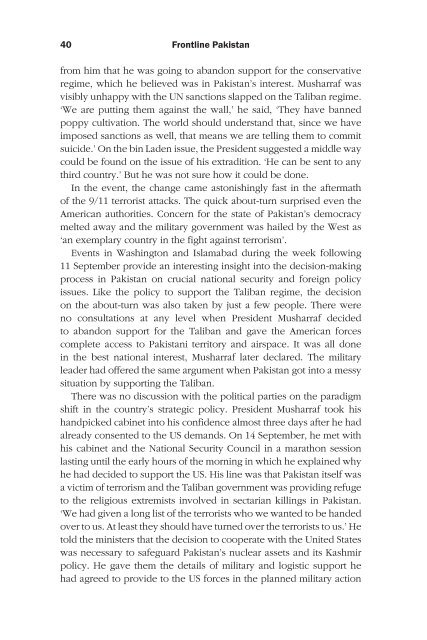Frontline Pakistan : The Struggle With Militant Islam - Arz-e-Pak
Frontline Pakistan : The Struggle With Militant Islam - Arz-e-Pak
Frontline Pakistan : The Struggle With Militant Islam - Arz-e-Pak
Create successful ePaper yourself
Turn your PDF publications into a flip-book with our unique Google optimized e-Paper software.
0 <strong>Frontline</strong> <strong><strong>Pak</strong>istan</strong><br />
from him that he was going to abandon support for the conservative<br />
regime, which he believed was in <strong><strong>Pak</strong>istan</strong>’s interest. Musharraf was<br />
visibly unhappy with the UN sanctions slapped on the Taliban regime.<br />
‘We are putting them against the wall,’ he said, ‘<strong>The</strong>y have banned<br />
poppy cultivation. <strong>The</strong> world should understand that, since we have<br />
imposed sanctions as well, that means we are telling them to commit<br />
suicide.’ On the bin Laden issue, the President suggested a middle way<br />
could be found on the issue of his extradition. ‘He can be sent to any<br />
third country.’ But he was not sure how it could be done.<br />
In the event, the change came astonishingly fast in the aftermath<br />
of the 9/11 terrorist attacks. <strong>The</strong> quick about-turn surprised even the<br />
American authorities. Concern for the state of <strong><strong>Pak</strong>istan</strong>’s democracy<br />
melted away and the military government was hailed by the West as<br />
‘an exemplary country in the fight against terrorism’.<br />
Events in Washington and <strong>Islam</strong>abad during the week following<br />
11 September provide an interesting insight into the decision-making<br />
process in <strong><strong>Pak</strong>istan</strong> on crucial national security and foreign policy<br />
issues. Like the policy to support the Taliban regime, the decision<br />
on the about-turn was also taken by just a few people. <strong>The</strong>re were<br />
no consultations at any level when President Musharraf decided<br />
to abandon support for the Taliban and gave the American forces<br />
complete access to <strong><strong>Pak</strong>istan</strong>i territory and airspace. It was all done<br />
in the best national interest, Musharraf later declared. <strong>The</strong> military<br />
leader had offered the same argument when <strong><strong>Pak</strong>istan</strong> got into a messy<br />
situation by supporting the Taliban.<br />
<strong>The</strong>re was no discussion with the political parties on the paradigm<br />
shift in the country’s strategic policy. President Musharraf took his<br />
handpicked cabinet into his confidence almost three days after he had<br />
already consented to the US demands. On 14 September, he met with<br />
his cabinet and the National Security Council in a marathon session<br />
lasting until the early hours of the morning in which he explained why<br />
he had decided to support the US. His line was that <strong><strong>Pak</strong>istan</strong> itself was<br />
a victim of terrorism and the Taliban government was providing refuge<br />
to the religious extremists involved in sectarian killings in <strong><strong>Pak</strong>istan</strong>.<br />
‘We had given a long list of the terrorists who we wanted to be handed<br />
over to us. At least they should have turned over the terrorists to us.’ He<br />
told the ministers that the decision to cooperate with the United States<br />
was necessary to safeguard <strong><strong>Pak</strong>istan</strong>’s nuclear assets and its Kashmir<br />
policy. He gave them the details of military and logistic support he<br />
had agreed to provide to the US forces in the planned military action













